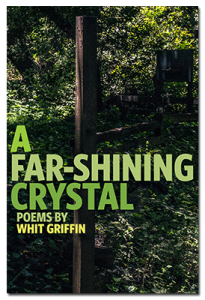A Far-Shining Crystal by Whit Griffin
 A Far-Shining Crystal
A Far-Shining Crystal
by Whit Griffin
The Cultural Society, 2013
70 pages / $15 Buy from SPD or The Cultural Society
…you can’t escape history – whatever you do, history informs and shapes you and your concept. Maybe to some degree you can push something somewhere, because all of our brains are unique structures of nature you can’t even play a lick like somebody else did, even if you’re expert at copying somebody what you’re doing is different by the nature of your brain chemistry. So all that’s to say that you can’t escape history because it presses down and weighs on you, the whole history of the universe, and it is also – I don’t want to say it’s moving forward because it’s not going anywhere, it just IS – but it is now.
– Matthew Shipp
Widely engaging, Whit Griffin confronts history as if a parlor trick turned serious. His poems offer counsel which surprises and confounds, conjuring disparate items of new and old lore at will. Griffin mixes together a celestial grab bag of cross cultural myth and magic presenting a head spinning engagement with what’s more or less generally recognizable as occulted literature. The structural supports he relies upon in terms of content are at once both factual and imagined. This poetry both is and is not a guide to esoteric knowledge. In Matthew Shipp’s words, “it’s not going anywhere, it just IS – but it is now.” Griffin reaches out to grab anything and everything speaking to the moment of the poem. He relentlessly spins the wheel of reference, plucking off correspondences as needed in an inspired bit of poetic magicking.
Collaging together lines heavy with symbolic imagery, Griffin tests intuition against imagination. Under Griffin’s care the affair of writing poems turns into an alchemical sleight of hand. The poems are listening to themselves go, line-by-line propelling a state of constant revelation yet refusing to reveal anything. Every set of lines are rungs of a ladder which lead only to further rungs. There’s plenty here for readers, along with the poet, to disappear into again and again. A revisiting ritual gets enacted on every page. Peel back one layer and you find yourself peeling it off again a few pages later.
These poems arrive full of many talismans. “Stone” is one of many words which, appearing throughout in individual lines and titles of poems, comes to take on properties similar to the sigil. For instance, there’s a poem, “Stone Called Jet” opening “As Blake is to yellow…” and in the poem “Bigger than the Material” mid-line we find: “A stone is a swifter.” While in a poem entitled “The River of Milk, the Snake Canoe” we get the following informative and detailed info:
out of stone. The force that formed the
stone can also dissolve it. Bacchus turned
the amethyst red. No god, but the translator,
turned Andromeda into a dromedary.
Tamberlane’s tent turned from white to red.
Red stones do not appeal to idealists. Roman
widows wore white. Rosicrucians believe iron
is the product of dark powers. The sly fox in
sympathy with the wily god. The lame god
is the provider of all good things.
The poem rolls on as one reference folds into the next, in the process unfolding one meaning in order to form another. Each line sparking off the one previous, springing a new set of thoughts reaching yet further afield as the poem runs down the page. Later this same poem tells us “There are seven amulets known / to all seafarers.” Continuing on to mention many specific stones: jade, coral, sapphire, turquoise, malachite, crystal, and the relations of stone-like objects: “Every tree trunk becomes a gnomon. Lost a gnomon, / gained a swearing hole.” The mark left by way of a protruding absence. There’s then a turn towards listing incredible what-if occasions, such as “To stroll with William Blake himself, and hear him speak / of the icelike Yuccas.” Before ending, “When he died his skull became the sky.” Matter of fact truth laid bare, plain as day.
November 1st, 2013 / 11:00 am
